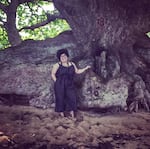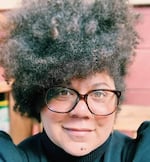Last year, Keia Booker and her partner visited the Willapa National Wildlife Refuge in Washington. While walking the trails, she crossed paths with a family: a white man and two children. She’s naturally a friendly, affable person, so she smiled and said hello — but the family wouldn’t engage with her.
She didn’t think too much of it at the time, but in recent weeks she’s been reflecting on the incident.
“I recognize now how often I am putting on a smile and trying to alleviate any threat that people I come across might feel,” she said. The incident's very familiarity speaks to its pervasiveness.

Portland birder and conservationist Keia Booker
Courtesy of Keia Booker
This week marked the inaugural Black Birder Week in America. It was a chance for Black birders, explorers and scientists across the country to share and connect with one another. It's been empowering for Black, Indigenous and other people of color, in what's widely thought of as white hobby, and it's been successful too: Booker said one online presentation drew a crowd of more than 50,000 people.
But the week is also a response to the prejudices faced by birders, conservationists and other outdoor enthusiasts who aren't white. The celebration was inspired by an incident in late May, when birder Christian Cooper documented a racist encounter in New York City's Central Park.
These aren’t freak occurrences. The more people you talk to, the more experiences you hear of similar confrontations. Booker said Black friends have been birding on Portland’s Sauvie Island when they were faced by people holding guns in a threatening way.
“It’s really hard to explain that to people who haven’t had those experiences," Booker said, "how there are a lot of threats that are out there on a daily basis."
Farming as an act of resistance
In her work, Booker pushes for change in how the outdoors and conservation elite engage with BIPOC communities. "BIPOC" stands for "Black, indigenous, and people of color," a term that refers to people of color, broadly, and that seeks to acknowledge the unique challenges Black and indigenous people face, in particular.
Booker is the senior human resources and equity manager for Portland Audubon, and is on the leadership team of Environmental Professionals of Color, a national network working on equity in a vast array of critical environmental issues.
Booker said BIPOC have been doing important environmental work for hundreds of years, as farmers and de facto conservationists, but have been left out of the narrative.
She said it’s time to reframe what it means to be an environmentalist in America.
“My Black family growing up in a really racist town in Virginia and farming was an act of resistance in and of itself,” she said. “They were environmentalists.”
The same conversations
Part of the challenge of confronting racism in the Pacific Northwest is the near-homogeneity of most communities here. When Booker moved to Portland 16 years ago from Oklahoma, she was surprised by most Pacific Northwesterners’ lack of racial awareness.
“This sort of neutral stance on it, that ‘I’m not racist, I don’t think about race’ is even more threatening and more harmful than just knowing where it exists,” she said.

Portland birder and conservationist Keia Booker
Courtesy of Keia Booker
It’s allowed people to believe it’s perfectly normal for birding communities to be almost exclusively white, or for conservation movements to be led by all-white faces. Booker is working hard to change that perception.
“Especially white people in the conservation movement need to be willing to make space for BIPOC voices that they’ve marginalized, not listened to and taken ideas from,” she said. “And to recognize the pain and trauma they’ve caused — sometimes through silence, sometimes through actions.”
Booker said part of that work also involves paying more attention to Black-led conservation organizations that are often overlooked. She points to Oregon education nonprofits like Camp Elso and Wild Diversity, as well as the Black Food Sovereignty Coalition.
Ultimately, Booker said it’s up to the leaders of conservation and environmental movements to make a conscious choice to allow different kinds of people to lead and more diverse conversations to flourish.
“Until we start adding that diversity in, we’re going to continue to have the same conversations,” she said.
Use the audio player above to hear the full conversation from OPB’s “Weekend Edition.”
